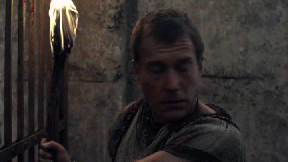| Ennius | ||
|---|---|---|

| ||
| First appearance | S3E02: Wolves at the Gate | |
| Last appearance | S3E02: Wolves at the Gate | |
| Profession | Aedile / Merchant | |
| Race | Roman | |
| Relationships | Laeta (Wife) Laurus (Friend, deceased) Heracleo (Ally, deceased) | |
| Status | Deceased (Killed by Spartacus) | |
| Actor/Actress | Pete Muller | |
Ennius is a Roman Aedile of Sinuessa en Valle and the husband of Laeta.
Appearance[]
Ennius is rather typical for the Roman outlook. He is tall, clean-shaven, has short-brown hair and is adorned in the attire typical for those of the elite Roman class.
Personality[]
Ennius is a man of business and takes personally detailing of all of his shipments and dealings. This mindset has put him into his business first and other matters second though he does take great care of his wife, Laeta, and the people of his city. Like most romans, he looks down on slaves as seen when cornered by the rebels, he insulted them and refused to surrender to them.
However, he was shown to have secret and shady tendencies as he made deals with Heracleo; a pirate captain (whom he claimed to his wife to have been helping the authorities hunt) to eliminate anyone he saw as rivals to his position and prestige. This shows he was a rather corrupt and desperate to maintain the structure of his city as well as his status by any means.
War of the Damned[]
Ennius is present as Laurus and other citizens are ready to stone a slave to death. He is approached by Laeta who remarks at the barbariety of the such an event. Ennius remarks that a slave is still a slave and that Laurus is doing what he must.[1] Laeta counters this by saying that any slave under Laurus would want to rebel, and have good reason for it.
When Spartacus, who is disguised, checks to find holdings of grain in the city he finds Laeta who wonders if Spartacus wishes to purchase some from their stock. Laeta and Spartacus chat while Ennius finishes dealings with another customer. Once finished, he looks to Spartacus and recognizes him as the man who had ended the stoning of the Sinuessa Slave earlier. Spartacus doesn't deny this after which Ennius thanks him from causing the crowd to become further spurred into a frenzy.
When the Rebels invade the city of Sinuessa, Ennius takes a clutch of his men to his gain storage. There he threatens the Rebels that unless they leave, he will burn all the grain. Spartacus brings Ennius his wife, Laeta, whom he believed to be dead. Laeta attemtps to negotiate with Ennius and at first the Aedile resists but begins to give in to do what his wife suggests. However, Spartacus does not leave this to chance and

Ennius is killed by Spartacus.
instead has Crixus and Gannicus sneak around into the grain holding and kill the guards, while Ennius is killed instantly as Spartacus stabs him through the mouth, severing his spine. Ennius falls back dead, but also drops the torch he carried which would set the oil throughout the holding ablaze, but Crixus catches it just in time. Laeta then weeps and mourns the death of her husband.
Later, it is revealed that he had shady dealings with the pirate Heracleo and his crew which both upsets and and angers Laeta who feels betrayed by the man she thought she loved with all her heart. Horrified and shamed to not have known her husband's true nature and actions, she turns to Spartacus and helps him when he gives aid to her people; possible seeing it as a means of attoning for her deceased husband's crimes.
Trivia[]
- Ennius is the second Aedile that appears in the series, the first being Mercato. It can also be noted that Batiatus was petitioning for the position of Aedile, but was killed in the Massacre at the House of Batiatus before being able to be given the title.
- In many lesser cities within the Republic of Rome, the Aedile was the closest equivalent to a mayor. In Rome itself, however, the four Aediles, two Curule and two Plebeian, were responsible for maintaining public buildings, supervising the markets and presiding over certain festivities.
- As the sole apparent chief official governing in Sinuessa en Valle, Ennius would have been known as the Summus Magistratus or "supreme magistrate".
- Ennius may be a member of the Gens Ennia, a Romanized clan with both Oscan and Greek ancestry from the town of Rudiae (modern Lecce) in Calabria. Members of the gens were known to be among the Equestrian order in the provinces of Italy.
- The Latin word for merchant is Mercator.
References[]
<references>
- ↑ Spartacus: War of the Damned Season 3; Episode 2